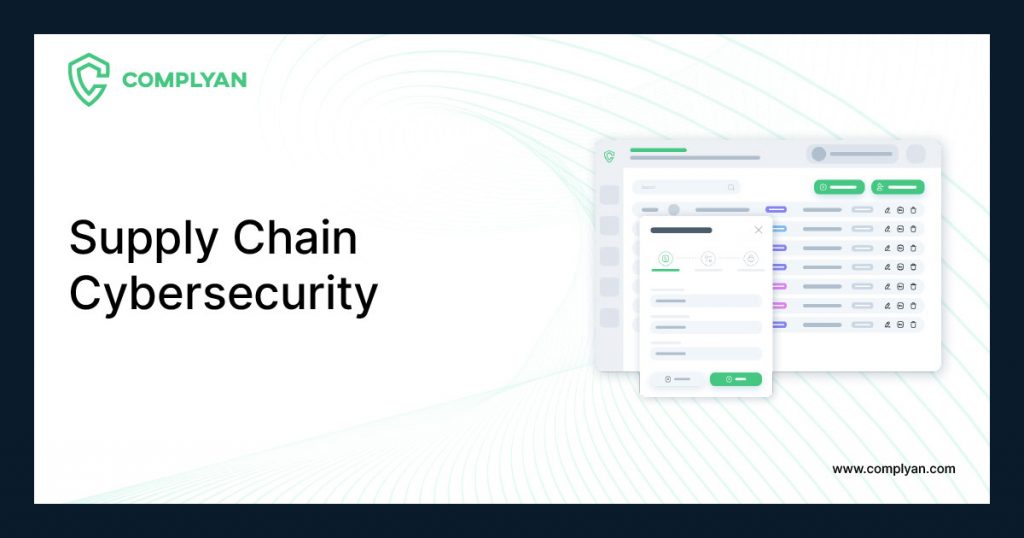Strengthening Supply Chain Cybersecurity With Complyan

Supply chain cybersecurity management is a crucial aspect of maintaining the security and integrity of an organization’s operations. In this modern connected world, organizations rely heavily on their supply chains to deliver products and services efficiently. However, this increased reliance on external vendors and suppliers comes with its own risks, particularly regarding cybersecurity.
Supply chain cybersecurity management is the process of ensuring the security and integrity of an organization’s supply chain, which includes its suppliers, vendors, partners, and customers.
According to a recent report by Accenture, 94% of organizations have experienced at least one supply chain cyberattack in the past year, resulting in an average cost of $4.4 million per incident. Moreover, the COVID-19 pandemic has increased the complexity and vulnerability of supply chains as organizations have to deal with disruptions, remote work, and digital transformation. These escalating risks necessitate giving supply chain cybersecurity the attention it deserves.
This blog explores the core components of supply chain cybersecurity and uncovers the proactive approach that Complyan offers in mitigating third-party risks and ensuring a resilient and secure supply chain environment.
Understanding the Challenges of Supply Chain Cybersecurity
Cybersecurity Threats in a Supply Chain
In today’s business landscape, supply chains play a crucial role in the success and competitiveness of organizations. Protecting the confidentiality, integrity, and availability of data and systems across the supply chain is essential to maintaining the trust of customers, preserving brand reputation, and ensuring business continuity.
However, supply chains are inherently complex, involving multiple entities, systems, and data exchanges. This complexity introduces various risks and vulnerabilities that cyberattackers can exploit. Some of the key risks include:
- Site-to-Site IPsec VPN connection to third-party outsourced service providers
The VPN connection between your organization and a third-party service provider creates a potential vulnerability point. If not properly secured, this connection can expose sensitive data and allow unauthorized access to your network. An attacker could exploit deficiencies in the VPN implementation, such as weak encryption or authentication protocols, to gain unauthorized access to your network and compromise the confidentiality, integrity, or availability of your data and systems. - Remote Access (SSL VPN) from third-party support personnel to your environment
Granting remote access to third-party support personnel introduces the risk of unauthorized access to your network and systems. If not properly managed, it can lead to potential data breaches or unauthorized modifications. Malicious actors could exploit vulnerabilities in the SSL VPN solution or compromise the credentials of the support personnel to gain unauthorized access. They may then attempt to steal sensitive data, introduce malware, or disrupt your operations. - Untrusted or semi-trusted B2B partner connections through the WAN/MPLS
Connecting with untrusted or semi-trusted business-to-business (B2B) partners exposes your network and systems to potential security risks. These partners may have weaker security controls or could be compromised, leading to an increased risk of unauthorized access or data breaches. Malicious actors may target the connection between your organization and the B2B partner to gain unauthorized access, extract sensitive data, or compromise your systems. They could exploit vulnerabilities in the connection or use it as a stepping stone to launch attacks on your network. - Use of third-party software for core business services
Using third-party software for core business services introduces the risk of software vulnerabilities or malicious code compromising the security of your systems and data. The third-party software may have weak security controls or contain hidden backdoors that could be exploited by attackers. A single compromised vendor or supplier can create a ripple effect throughout the supply chain, potentially exposing sensitive data or introducing malicious code. - Contractor/third-party connection into your corporate environment
Allowing contractors or third-party vendors to connect to your corporate environment introduces the risk of unauthorized access, data breaches, or malicious activities. Contractors may not have the same level of security controls as your organization, increasing the likelihood of vulnerabilities. Malicious or compromised contractors could abuse their access privileges to steal or manipulate data, disrupt operations, or compromise your systems. They may also introduce malware or unauthorized software into your environment.
Challenges of Supply Chain Cybersecurity
Various challenges face the efficiency and effectiveness of cybersecurity efforts in a supply chain. Some of these include:
- Organizations often have none or limited visibility into their supply chain partners’ cybersecurity practices, compliance status, and vulnerabilities, making it challenging to assess, manage, and control associated risks.
- Inconsistency and inefficiency in conducting vendor assessments and audits across different regions and sectors.
- Increasing sophistication and frequency of cyberattacks targeting supply chains, such as ransomware, phishing, data breaches, and sabotage.
- Evolving regulatory and customer expectations regarding supply chain security and transparency
Solutions to Supply Chain Cybersecurity Challenges
Organizations must adopt a proactive approach to effectively address the challenges of supply chain cybersecurity. Reactive measures alone are no longer sufficient in the face of sophisticated cyber threats. Proactive cybersecurity measures involve taking preemptive actions to identify, assess, and mitigate risks before they can cause significant damage. By implementing proactive measures, organizations can detect vulnerabilities early, enhance threat intelligence, and establish resilient defense mechanisms.
Some of the key measures include:
- Establishing a clear and comprehensive supply chain security strategy and policy
- Implementing a robust and scalable platform for managing third-party risks and vendor assessments
- Leveraging data and analytics to monitor and report on supply chain security performance and incidents
- Collaborating and communicating with vendors to ensure alignment and accountability on security standards and best practices
- Providing ongoing training and awareness to staff and vendors on supply chain security issues and responsibilities
How Complyan Can Help in Supply Chain Cybersecurity Management

Complyan is an intuitive SaaS solution that offers management tools for supply chain security and end-to-end cybersecurity. The platform helps businesses to automate workflows, connect with their partners, and adhere to numerous standards and regulations while streamlining their supply chain security processes. Complyan distinguishes itself from any other solution on the market by offering a centralized, integrated, and flexible platform that can adapt to the particular needs and difficulties of each organization. Complyan also supports and aligns with various standards and frameworks for supply chain security, such as ISO 27001, NIST CSF, CMMC, and GDPR.
Some of the key modules and features of Complyan that help in supply chain security include:
- Third-Party Risk Management: Complyan helps organizations identify and assess the cyber risks associated with their third-party vendors. Complyan allows organizations to create and maintain a vendor inventory, assign risk ratings and categories, conduct risk assessments using predefined or customized questionnaires, and generate risk reports and dashboards.
- Vendor Assessment and Due Diligence: Complyan helps organizations manage their vendor assessments and due diligence processes. Complyan enables organizations to schedule and conduct vendor audits, collect and verify vendor evidence and documentation, track and remediate vendor findings and issues, and evaluate vendor performance and compliance.
- Monitoring and Reporting: Complyan helps organizations monitor and report on their supply chain security performance and incidents. Complyan provides real-time data and analytics on vendor risk scores, assessment results, audit status, issue resolution, and incident response. Complyan also allows organizations to create and export customized reports and alerts for internal and external stakeholders.
- Collaboration and Communication: Complyan helps organizations collaborate and communicate with their vendors on supply chain security issues and tasks. Complyan allows organizations to share and exchange information and documents with vendors, assign and track vendor actions and responsibilities, provide feedback and ratings to vendors, and communicate with vendors via email or chat.
- Scalability and Adaptability: Complyan helps organizations scale and adapt their supply chain security processes to meet their evolving needs and challenges. Complyan allows organizations to add or remove vendors, modify or create assessment templates, update or customize risk ratings and categories, and configure or change security standards and regulations.
- Automation and Efficiency: Complyan helps organizations automate and streamline their supply chain security workflows and tasks. Complyan enables organizations to automate vendor risk assessments, audit scheduling, evidence collection and verification, issue tracking and remediation, report generation and distribution, and alert notification. Complyan also helps organizations reduce manual errors, duplication of work, and operational costs.
Key Benefits of Using Complyan for Supply Chain Cybersecurity
By consolidating all supply chain-related security activities in one place, Complyan provides a holistic view of the entire ecosystem. Organizations enjoy the following benefits by utilizing Complyan for supply chain cybersecurity management:
- Enhanced risk visibility and control: Complyan provides a central platform that consolidates all supply chain cybersecurity data, giving businesses full visibility into their risk landscape. Organizations are better able to recognize, evaluate, and rank risks when all pertinent information is in one location. This also allows them to track and monitor the security posture of their supply chain partners, ensuring that necessary security controls and measures are in place.
- Scalability and adaptability: Complyan is designed to scale with the growth and complexity of an organization’s supply chain. As organizations expand their network of suppliers and partners, Complyan can accommodate the increasing volume of data and provide a flexible framework to manage supply chain cybersecurity effectively. Additionally, Complyan is adaptable to evolving cybersecurity requirements and regulatory changes.
- Automation: Complyan automates the process of conducting risk assessments and audits, resulting in increased efficiency and accuracy. Through predefined templates and workflows, organizations can streamline the assessment process, eliminating manual and time-consuming tasks. Complyan also facilitates data collection, analysis, and reporting, reducing human error and ensuring consistent evaluation of supply chain partners’ security practices.
- Strengthened collaboration and communication: Complyan enhances collaboration and communication between organizations and vendors across their supply chain. It provides a secure platform for the exchange of knowledge about cybersecurity procedures, guidelines, and legal obligations. As a result of the deeper relationships fostered by this cooperative approach, risk management and alignment of security goals are easier and more possible.
- Centralized security effort: Complyan offers a single point of truth for all supply chain security information and operations. Organizations can access and manage all of their vendor information, risk evaluations, audit findings, problem-solving techniques, and incident response from one place. Additionally, Complyan interacts with other programs and devices, including CRM, ERP, SIEM, and GRC, to offer a comprehensive perspective of supply chain security.





 Governance and Policy Management
Governance and Policy Management